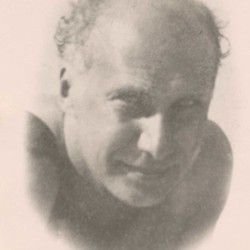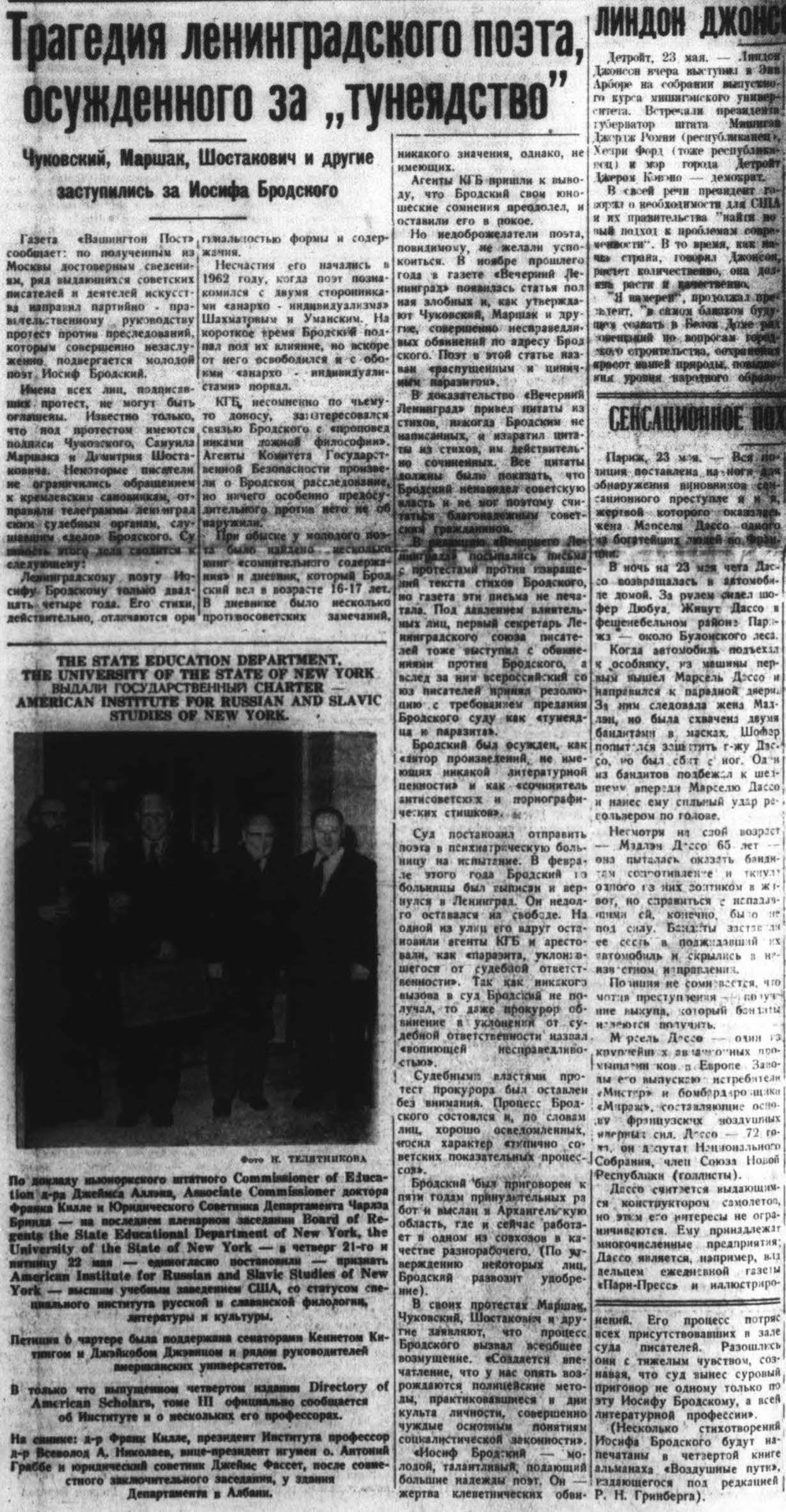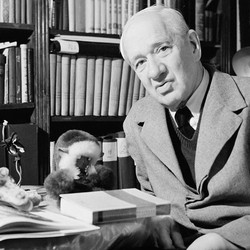The Tragedy of a Leningrad Poet Convicted for 'Parasitism'

Чуковский, Маршак, Шостакович и другие заступились за Иосифа Бродского
Газета «Вашингтон Пост» сообщает: по полученным из Москвы достоверным сведениям, ряд выдающихся советских писателей и деятелей искусства направил партийно-правительственному руководству протест против преследований, которым совершенно незаслуженно подвергается молодой поэт Иосиф Бродский.
Имена всех лиц, подписавших протест, не могут быть оглашены. Известно только, что под протестом имеются подписи Чуковского, Самуила Маршака и Дмитрия Шостаковича. Некоторые писатели не ограничились обращением к кремлевским сановникам, отправили телеграммы ленинградским судебным органам, слушавшим «дело» Бродского. Сущность этого дела сводится к следующему:
Ленинградскому поэту Иосифу Бродскому только двадцать четыре года. Его стихи, действительно, отличаются оригинальностью формы и содержания.
Несчастия его начались в 1962 году, когда поэт познакомился с двумя сторонниками «анархо-индивидуализма» Шахматовым и Уманским. На короткое время Бродский подпал под их влияние, но вскоре от него освободился и с обоими «анархо-индивидуалистами» порвал.
КГБ, несомненно, по чьему-то доносу, заинтересовался связью Бродского с «проповедниками ложной философии». Агенты Комитета Государственной Безопасности произвели о Бродском расследование, но ничего особенно предосудительного против него не обнаружили.
При обыске у молодого поэта было найдено несколько книг «сомнительного содержания» и дневник, который Бродский вел в возрасте 16–17 лет. В дневнике было несколько противосоветских [sic!] замечаний, никакого значения, однако, не имеющих.
Агенты КГБ пришли к выводу, что Бродский свои юношеские сомнения преодолел, и оставили его в покое.
Но недоброжелатели поэта, по-видимому, не желали успокоиться. В ноябре прошлого года в газете «Вечерний Ленинград» появилась статья[,] полная злобных и, как утверждают Чуковский, Маршак и другие, совершенно несправедливых обвинений по адресу Бродского. Поэт в этой статье назван «распущенным и циничным паразитом».
В доказательство «Вечерний Ленинград» привел цитаты из стихов, никогда Бродским не написанных, и извратил цитаты из стихов, им действительно сочиненных. Все цитаты должны были показать, что Бродский ненавидел советскую власть и не мог поэтому считаться благонадежным советским гражданином.
В редакцию «Вечернего Ленинграда» посылались письма с протестами против извращений текста стихов Бродского, но газета эти письма не печатала. Под давлением влиятельных лиц, первый секретарь Ленинградского союза писателей тоже выступил с обвинениями против Бродского, а вслед за ним всероссийский союз писателей принял резолюцию с требованием предания Бродского суду как «тунеядца и паразита».
Бродский был осужден как «автор произведений, не имеющих никакой литературной ценности» и как «сочинитель антисоветских и порнографических стишков».
Суд постановил отправить поэта в психиатрическую больницу на испытание. В феврале этого года Бродский из больницы был выписан и вернулся в Ленинград. Он недолго оставался на свободе. На одной из улиц его вдруг остановили агенты КГБ и арестовали как «паразита, уклонившегося от судебной ответственности». Так как никакого вызова в суд Бродский не получал, то даже прокурор обвинение в уклонении от судебной ответственности назвал «вопиющей несправедливостью».
Судебными властями протест прокурора был оставлен без внимания. Процесс Бродского состоялся и, по словам лиц, хорошо осведомленных, носил характер «типично советских показательных процессов».
Бродский был приговорен к пяти годам принудительных работ и выслан в Архангельскую область, где и сейчас работает в одном из совхозов в качестве разнорабочего. (По утверждению некоторых лиц, Бродский разводит удобрение.)
В своих протестах Маршак, Чуковский, Шостакович и другие заявляют, что процесс Бродского вызвал всеобщее возмущение. «Создается впечатление, что у нас опять возрождаются полицейские методы, практиковавшиеся в дни культа личности, совершенно чуждые основным понятиям социалистической законности».
«Иосиф Бродский – молодой, талантливый, подающий больше надежды поэт. Он – жертва клеветнических обвинений. Его процесс потряс всех присутствовавших в зале суда писателей. Разошлись они с тяжелым чувством, сознавая, что суд вынес суровый приговор не одному только поэту Иосифу Бродскому, а всей литературной профессии».
(Несколько стихотворений Иосифа Бродского будут напечатаны в четвертой книге альманаха «Воздушные пути», издающегося под редакцией Р.Н. Гринберга).
Chukovsky, Marshak, Shostakovich, and others petition for Iosif Brodskii
Washington Post informs that according to the reliable account received from Moscow, a number of important Soviet writers and cultural figures sent a letter of protest to the Party and Government leadership concerning undeserved persecution of a young poet Iosif Brodskii.
The names of all those who signed the document cannot be made public. We only know that among the undersigned were Chukovsky, Samuil Marshak, and Dmitry Shostakovich. Some writers not only sent the letter of protest to the Kremlin functionaries but also dispatched telegrams to the Leningrad Court, where Brodskii was being tried.
Here is the summary of the case. Iosif Brodskii, a Leningrad poet, is only twenty-four. His poems are indeed quite original in terms of their form and content.
His misfortunes started in 1962, when Brodskii met Shakhmatov and Umanskii, supporters of “anarcho-individualism.” For a brief period of time, Brodskii fell under their influence but later on broke up with the group.
Following someone’s denunciation, the KGB became interested in the connection between Brodskii and the “preachers of the false philosophy.” The agents of the Committee for State Security performed their investigation; however, they failed to discover anything reprehensible.
During the search, a few books of “questionable content,” as well as a diary that Brodskii had written at the age of 16 or 17, were found. The diary contained a couple of anti-Soviet observations that were hardly of any consequence.
KGB agents concluded that Brodskii has overcome his earlier hesitations, and so he was left alone.
However, the poet’s adversaries could not let it go. In November of last year, The Evening Leningrad published an article filled with angry and, according to Chukovsky, Marshak, and others, utterly unfair accusations against Brodskii. This article labeled Brodskii a “dissolute person and a cynical parasite.”
To prove its point, The Evening Leningrad quoted from the poems that did not belong to Brodskii, as well as distorted the quotations from those ones that Brodskii indeed had authored. The citations were meant to demonstrate that Brodskii hated the Soviet system, and therefore could not be considered a trustworthy Soviet citizen.
The editorial office of The Evening Leningrad was flooded with letters of protest against distortions of Brodskii’s poetry, and yet those letters have never been published. Under the pressure of high-ranking officials, the First Secretary of the Leningrad Writers’ Union also expressed accusations again Brodskii, followed by the All-Russian Writers’ Union resolution demanding to put Brodskii on trial as a “dissolute and parasite.”
Brodskii was convicted as an “author of works lacking any literary value” and a “creator of anti-Soviet and pornographic couplets.”
The court ruled to send the poet to the psychiatric facility for evaluation. In February of the current year, Brodskii was allowed to check out from the facility and return to Leningrad. His freedom did not last long. He was stopped by the KGB when walking out on the streets, and arrested on the grounds of “parasitism and evasion of prosecution.” Since Brodskii was never called to appear in court, even the prosecutor characterized the accusation of prosecution evasion as “flagrant injustice.”
The legal authorities did not pay any attention to the prosecutor’s protest. The trial over Brodskii took place and was characterized by those who are well informed as a “typical Soviet show trial.”
Brodskii was sentenced to five years of forced labor and exiled to the Arkhangelsk oblast, where he is still working in a sovkhoz doing odd jobs. (According to some, Brodskii delivers manure.)
In the letter of protest, Marshak, Chukovsky, Shostakovich, and others declare that Brodskii’s trial caused a general outrage. “It looks like the brutal methods that used to be practiced during the times of the cult of personality and that are foreign to our understanding of the socialist legal system, are being revived again.”
“Iosif Brodskii is a young, talented, and promising poet. He is a victim of slander. His trial shocked all those present in the auditorium of the Writers’ Union Court. They left with a heavy feeling, conscious of the fact that the court convicted not only the poet Iosif Brodskii, but the entire literary profession.”
(A few poems by Iosif Brodsky will be published in the fourth book of the almanac Vozdushnye Puti, edited by R.N. Grynberg.)
"

